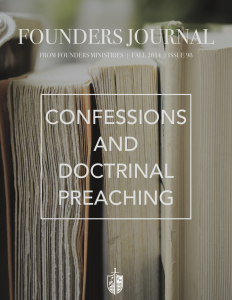Second London Confession
Chapter 26
On the Local Church
Introduction:
There are two problems that greatly afflict the church of Jesus Christ in the world today. First, the widespread lack of spiritual vitality that characterizes many congregations. While there are obvious exceptions, liberalism, humanism, modernism and post-modernism have played their part in the service of our sworn enemies, the world, the flesh and the devil.
In addition to the lack of spirituality is the low opinion that so many today have of the church of Christ. This is true not only of the world in general (which is expected), but also of professing Christians. Many parachurch organizations generate more respect and loyalty from Christians than the church does. Church membership is increasingly regarded as irrelevant if not completely unbiblical. Many Christians think that they can faithfully follow Christ on their own, or while being only tangentially associated with a church.
In the face of such realities the need to reexamine what Scripture teaches about the role of the church is vitally important. One helpful guide in such a process is chapter 26 of the Second London Confession of Faith.
The first four paragraphs of this chapter describe the church of Jesus Christ across history and around the world. After affirming what the New Testament teaches about the universal church, the confession shifts its focus to the local expressions of Christ’s body which are commonly called local churches. The bulk of the chapter (eleven paragraphs) is given to this subject, which is very appropriate since the bulk of the New Testament’s teaching centers upon the local church.
The doctrine of the local church can be considered under five broad categories of New Testament teaching.
I. The Origin of a Local Church (paragraph 5):
In the execution of this power wherewith he is so intrusted, the Lord Jesus calleth out of the world unto himself, through the ministry of his word, by his Spirit, those that are given unto him by his Father, that they may walk before him in all the ways of obedience, which he prescribeth to them in his word. Those thus called, he commandeth to walk together in particular societies, or churches, for their mutual edification, and the due performance of that public worship, which he requireth of them in the world. (John 10:16; John 12:32. Matt. 28:20. Matt. 28:15–20)
A. Jesus Christ is the only proper “church planter”
1. He calls people “out of the world” to Himself (John 10:16)
a. This is the call to salvation
b. He does this by His Word and Spirit (through the proclamation of His gospel; i.e. the effectual call (see chapter 10 of the confession)
2. He calls the elect (“those that are given unto him by his Father”) to a life of obedience. Matthew 28:20, “teaching them to observe all things that I have commanded you.”
3. He commands believers to live together in local churches (“particular societies”)
a. This (a local church) is the context in which believers are to be taught “to observe…”
b. Matthew 18:15–20— Jesus instructs a local church on how to correct an impenitent member
c. This understanding is demonstrated by the work of the apostles in the Book of Acts.
1) They preached; gathered converts into churches – Acts 17:3, 4; 1 Thessalonians 1:1
2) They appointed leaders in the churches to carry out the teaching ministry —Acts 15:3, 4, 22; 1 Thessalonians 4:12
B. The local church is indispensible to the great commission—Believers cannot be taught to observe all the Christ has commanded outside of faithfulness to a local church.
II. The Membership of a Local Church (paragraph 6):
The members of these churches are saints by calling, visibly manifesting and evidencing (in and by their profession and walking) their obedience unto that call of Christ; and do willingly consent to walk together, according to the appointment of Christ; giving up themselves to the Lord, and one to another, by the will of God, in professed subjection to the ordinances of the Gospel. (Rom. 1:17; 1 Cor. 1:2. Acts 2:41,42; 5:13,14; 2 Cor. 9:13)
A. Members must be converted—“saints by calling”
1. Disciples; those who have received the gospel
2. Baptized—evidence of their discipleship by giving themselves up to the Lord by the will of God “in professed subjection to the ordinances of the Gospel”
B. Members voluntarily unite—“do willingly consent to walk together”
1. Not by state mandate
2. Not by inheritance (ie. bloodlines)
C. Members covenant together—“giving up themselves to the Lord, and one to another…”
1. Mutual commitment to one another
2. Agreement to serve the Lord together—Acts 2:41–42, exemplifies this spirit and commitment (cf. Acts 4:33–35)
III. The Authority of a Local Church (paragraph 7):
To each of these churches thus gathered, according to his mind declared in his word, he hath given all that power and authority, which is in any way needful for their carrying on that order in worship and discipline, which he hath instituted for them to observe; with commands and rules for the due and right exerting, and executing of that power. (Matt. 28:17,18; 1 Cor. 5:4,5; 5:13; 2 Cor. 2: 6-8.)
A. Jesus Christ invests His own authority in a duly organized, biblically ordered church. —This is seen in Matthew 18:18–20; 1 Corinthians 5:1–13 (especially vv. 4–5)
B. Each local church is autonomous and independent —The churches in Asia Minor (Revelation 2–3) demonstrate this. Christ exhorts them about discipline, but He does not suggest that the entire group of churches is responsible for each other’s discipline cases.
C. Each church is responsible to follow the rules of Christ is exercising this authority
APPLICATION: The fact that Jesus has vested His own authority in a biblically ordered church ought to make His disciples have great respect and regard for the church. Those who reject the teaching and authority of such a church are actually rejecting the teaching and authority of Jesus Christ.
IV. The Government of a Local Church (paragraphs 8–13)
A. The basic composition of a church is found it is officers and members (8–9):
A particular church, gathered and completely organized according to the mind of Christ, consists of officers and members; and the officers appointed by Christ to be chosen and set apart by the church (so called and gathered), for the peculiar administration of ordinances, and execution of power or duty, which he intrusts them with, or calls them to, to be continued to the end of the world, are bishops or elders, and deacons. (Acts xx. 17,28; Phil. i. 1).
The way appointed by Christ for the calling of any person, fitted and gifted by the Holy Spirit, unto the office of bishop or elder in a church, is, that he be chosen thereunto by the common suffrage of the church itself; and solemnly set apart by fasting and prayer, with imposition of hands of the eldership of the church, if there be any before constituted therein; and of a deacon that he be chosen by the like suffrage, and set apart by prayer, and the like imposition of hands. (Acts 14:23; 1 Timothy 4:14; Acts 6:3, 5, 6)
1. Members, as already noted, are to be converted, baptized, covenanted believers
2. Officers
a. Who are they?—“bishops or elders and deacons”— Only two ordinary, ongoing offices
• Philippians 1:1
• 1 Timothy 3:1–13
b. How does a member become an officer?
• “The way appointed by Christ”—how officers are to be recognized
1) A man must be “fitted and gifted by the Holy Spirit”
a. He needs to meet the character qualifications spelled out in 1 Timothy 3:1–7, Titus 1:5–11, etc. for an elder and Acts 6:1–6 and 1 Timothy 3:8–13 for a deacon.
b. He must have recognized ability—recognized by the church
2) A man must be “chosen and set apart by the church;” this is a congregational decision
• The general process to follow is given in paragraph 9
APPLICATION: The confession emphasizes two ingredients in the recognition and calling of elders (bishops) and deacons. There should be both an internal and an external call. The internal call is that sense within a man that the Lord has gifted him to serve as an officer and has granted him a “desire” for the work (1 Timothy 3:1). Mere desire is not enough, but desire joined with gifting with a sense of meeting the character qualifications in a realistic manner.
In addition to the internal call there is the external call, indicated in the confession by referring to the “common suffrage of the church itself.” In other words, a man should not be imposed on the congregation as an officer, nor should he impose himself.
B. The basic means of governing the church is the ministry of the Word (paragraphs 10–11)
The church is to be ruled by the Word of God. The responsibility of its officers is to see to it that the ministry of the Word continues. This is demonstrated in Acts 6:1–4 where the purpose of the first deacons is expressed in terms of protecting the ministry of the Word.
• Such ministry of the Word is to be carried out by what Sam Waldron calls both the “official” and “auxiliary” ministry of the Word in the church
1. The official ministry of the Word is conducted by pastors (paragraph 10):
10. The work of pastors being constantly to attend the service of Christ, in his churches, in the ministry of the word and prayer, with watching for their souls, as they that must give an account to Him; it is incumbent on the churches to whom they minister, not only to give them all due respect, but also to communicate to them of all their good things, according to their ability, so as they may have a comfortable supply, without being themselves entangled in secular affairs; and may also be capable of exercising hospitality towards others; and this is required by the law of nature, and by the express order of our Lord Jesus, who hath ordained that they preach the Gospel should live of the Gospel. (Acts vi. 4; Heb. xiii. 17. 1 Tim. v. 17,18; Gal. vi. 6,7. 2 Tim. ii. 4. 1 Tim. iii. 2. 1 Cor. ix. 6-14).
a. Pastors are called to carry out this ministry on regular basis
b. Churches are called to support financially their pastors “according to their ability”—1 Timothy 5:17–18
2. The auxiliary ministry of the Word is conducted by other able men (paragraph 11):
Although it be incumbent on the bishops or pastors of the churches, to be instant in preaching the word, by way of office, yet the work of preaching the word is not so peculiarly confined to them but that others also gifted and fitted by the Holy Spirit for it, and approved and called by the church, may and ought to perform it. (Acts 11:19-21; 1 Peter 4:10, 11)
APPLICATION: This means that, under the general oversight of the elders, men other than elders/pastors may also preach and teach in the church.
C. The extent of the church’s government extends as far as its membership (paragraph 12):
As all believers are bound to join themselves to particular churches, when and where they have opportunity so to do; so all that are admitted unto the privileges of a church, are also under the censures and government thereof, according to the rule of Christ. (1 Thess. 5:14; 2 Thess. 3: 6,14,15).
• The basic point is church discipline extends to all church members and all church problems.
APPLICATION: Every Christian should submit to the oversight of a local church as a part of discipleship. It is “according to the rule of Christ” for Christians to be so united to—and submitted to—a local church.
ILLUSTRATION: An excellent book that elaborates this point is by Jonathan Leeman, called Church Membership (Crossway, 9Marks imprint). Leeman likens a Christian’s relationship to a local church as a citizen to an embassy in a foreign land. The embassy is an outpost of the homeland and the citizen is to relate to the authorities in the embassy as representatives of the duly appointed authorities of his homeland. Thus church membership is not so much joining as one would join a club or society, as it is submitting as one would upon becoming a citizen of a new country.
D. Every member should highly esteem the church and its government (paragraph 13):
No church members, upon any offence taken by them, having performed their duty required of them towards the person they are offended at, ought to disturb and church-order, or absent themselves from the assemblies of the church, or administration of any ordinances, upon the account of such offence at any of their fellow members, but to wait upon Christ, in the further proceeding of the church. (Matt. 28: 15-17; Eph.4: 2,3).
1. No Christian should willingly disturb the peace and unity of the church when troubles arise
2. Every Christian—church member—must recognize the importance of the church and the seriousness of disturbing its peace
3. Instead of seeking to vindicate oneself, even when offended, church members must wait on Christ to resolve the issue.
a. He is the Head of the church
b. He will vindicate His cause and His people
c. He rules over the elders
d. Do not forget the presence of the risen Christ in the church. Therefore follow His rules and patiently wait on Him; exercise faith!
APPLICATION: This section highlights the seriousness of schism, divisiveness in a church. Too often today offended church members take their pain as a justification to leave the church or to go on a campaign to gather supporters against the offending party. Such is contrary to the Word of God and the Spirit of Christ.
V. The communion of local churches with each other (paragraphs 14–15):
As each church, and all the members of it, are bound to pray continually for the good and prosperity of all the churches of Christ, in all places, and upon all occasions to further every one within the bounds of their places and callings, in the exercise of their gifts and graces, so the churches, when planted by the providence of God, so as they may enjoy opportunity and advantage for it, ought to hold communion among themselves, for their peace, increase of love, and mutual edification. (Eph. 6: 18; Ps. 122: 6. Rom. 16: 1,2; 3 John 8–10).
A. Churches should pray for each other (“are bound to pray continually for the good and prosperity of all the churches of Christ”)
1. This is a helpful antidote to pride and sectarianism
2. It is instructive to church members to hear other congregations prayed for by name
3. It communicates to unbelievers a unity—at least at some level—that every church of the Lord Jesus has with all other such churches
B. Churches and individual Christians are to encourage one another
C. Churches, when planted in regions where they have opportunity to “hold communion” with other churches, ought to do so—fellowship and cooperate
1. This, together with paragraph 15, is the “associational principle”
2. It is taken from the Savoy Platform of Polity word for word
3. It is also built on the same conviction expressed in the 1st London Baptist Confession, Article 37:
And Although the particular Congregations be distinct and severall Bodies, every one a compact and knit Citie in it selfe; yet are they all to walk by one and the same Rule, and by all meanes convenient to have the counsell and help one of another in all needfull affaires of the Church, as members of one body in the common faith under Christ their onely head” (Lumpkin, 168-69).
D. When difficulties or disruptions occur in a church or among churches, many churches should send messengers to consider the matter and give advice (paragraph 15):
In cases of difficulties or differences, either in point of doctrine or administration, wherein either the churches in general are concerned, or any one church, in their peace, union, and edification; or any member or members of any church are injured, in or by any proceedings in censures not agreeable to truth and order: it is according to the mind of Christ, that many churches holding communion together, do, by their messengers, meet to consider, and give their advice in or about that matter in difference, to be reported to all the churches concerned; howbeit these messengers assembled, are not intrusted with any jurisdiction over the churches themselves, to exercise any censures either over any churches or persons; or to impose their determination on the churches or officers. (Acts xv. 2–6,22,23,25. 2 Cor. i. 24; 1 John iv. 1).
1. Local churches should call on one another for help (in difficult cases, when outside counsel is needed)
2. The autonomy of each church is protected while the benefit of the wisdom of many churches is afforded
a. Though independent a church should not be isolated
b. There is a recognition of interdependence among sister churches that are each fully autonomous
EXPOSITION: The nature of this “holding communion” has been the subject of no small debate in recent years. The main question is the nature of associationalism. Some recognize the confession requiring a formal association of churches whereas others see the confessional position being satisfied by informal association. It is unlikely that this debate will be resolved anytime soon to widespread satisfaction of those holding to the 1689.
CONCLUSION: The confession highlights the biblical emphasis on the importance of local churches in the mission of God and the life of discipleship. When a person becomes a follower of Jesus no small part of that commitment is to take membership in a local church seriously. Each member is called by Christ to be faithful in using gifts, serving the cause of Christ and encouraging others to do the same. Each member shares the responsibility of the whole church to fulfill its ministry to the world by preaching the gospel and bearing witness to the truth and power of the gospel in the way that he lives with other believers in the body.
XXVI. OF THE CHURCH
26:1 The catholic or universal church, which (with respect to the internal work of the Spirit and truth of grace) may be called invisible, consists of the whole number of the elect, that have been, are, or shall be gathered into one, under Christ, the head thereof; and is the spouse, the body, the fullness of him that fills all in all [a].
[a] Hebrews 12:23; Colossians 1:18; Ephesians 1:10,22,23; 5:23,27,32
26:2 All persons throughout the world, professing the faith of the gospel, and obedience unto God by Christ according unto it, not destroying their own profession by any errors everting the foundation, or unholiness of conversation, are and may be called visible saints; [b] and of such ought all particular congregations to be constituted [c].
[b] 1 Corinthians 1:2; Acts 11:26 [c] Romans 1:7; Ephesians 1:20–22
26:3 The purest churches under heaven are subject to mixture and error; [d] and some have so degenerated as to become no churches of Christ, but synagogues of Satan; [e] nevertheless Christ always has had, and ever shall have a kingdom in this world, to the end thereof, of such as believe in Him, and make profession of His name [f].
[d] 1 Corinthians 5; Revelation 2,3 [e] Revelation 18:2; 2 Thessalonians 2:11,12 [f] Matthew 16:18; Psalm 72:17, 102:28; Revelation 12:17
26:4 The Lord Jesus Christ is the Head of the church, in whom, by the appointment of the Father, all power for the calling, institution, order or government of the church, is invested in a supreme and sovereign manner; [g] neither can the Pope of Rome in any sense be head thereof, but is that antichrist, that man of sin, and son of perdition, that exalts himself in the church against Christ, and all that is called God; whom the Lord shall destroy with the brightness of His coming [h].
[g] Colossians 1:18; Matthew 28:18–20; Ephesians 4:11,12 [h] 2 Thessalonians 2:2–9
26:5 In the execution of this power wherewith he is so intrusted, the Lord Jesus calls out of the world unto Himself, through the ministry of His Word, by His Spirit, those that are given unto Him by His Father, [i] that they may walk before Him in all the ways of obedience, which He prescribes to them in His Word [k]. Those thus called, He commands to walk together in particular societies, or churches, for their mutual edification, and the due performance of that public worship, which He requires of them in the world [l].
[i] John 10:16; John 12:32 [k] Matthew 28:20 [l] Matthew 18:15–20
26:6 The members of these churches are saints by calling, visibly manifesting and evidencing (in and by their profession and walking) their obedience unto that call of Christ; [m] and do willingly consent to walk together, according to the appointment of Christ; giving up themselves to the Lord, and one to another, by the will of God, in professed subjection to the ordinances of the Gospel [n].
[m] Romans 1:7; 1 Corinthians 1:2 [n] Acts 2:41,42, 5:13,14; 2 Corinthians 9:13
26:7 To each of these churches thus gathered, according to His mind declared in His Word, He has given all that power and authority, which is in any way needful for their carrying on that order in worship and discipline, which He has instituted for them to observe; with commands and rules for the due and right exerting, and executing of that power [o].
[o] Matthew 18:17,18; 1 Corinthians 5:4, 5, 5:13, 2 Corinthians 2:6–8
26:8 A particular church, gathered and completely organized according to the mind of Christ, consists of officers and members; and the officers appointed by Christ to be chosen and set apart by the church (so called and gathered), for the peculiar administration of ordinances, and execution of power or duty, which he entrusts them with, or calls them to, to be continued to the end of the world, are bishops or elders, and deacons [p].
[p] Acts 20:17, 28; Philippians 1:1
26:9 The way appointed by Christ for the calling of any person, fitted and gifted by the Holy Spirit, unto the office of bishop or elder in a church, is, that he be chosen thereunto by the common suffrage of the church itself; [q] and solemnly set apart by fasting and prayer, with imposition of hands of the eldership of the church, if there be any before constituted therein; [r] and of a deacon that he be chosen by the like suffrage, and set apart by prayer, and the like imposition of hands [s].
[q] Acts 14:23 [r] 1 Timothy 4:14 [s] Acts 6:3,5,6
26:10 The work of pastors being constantly to attend the service of Christ, in His churches, in the ministry of the word and prayer, with watching for their souls, as they that must give an account to Him; [t] it is incumbent on the churches to whom they minister, not only to give them all due respect, but also to communicate to them of all their good things according to their ability, [u] so as they may have a comfortable supply, without being themselves entangled in secular affairs; [x] and may also be capable of exercising hospitality towards others; [y] and this is required by the law of nature, and by the express order of our Lord Jesus, who has ordained that they that preach the Gospel should live of the Gospel [z].
[t] Acts 6:4; Hebrews 13:17 [u] 1 Timothy 5:17,18; Galatians 6:6,7 [x] 2 Timothy 2:4 [y] 1 Timothy 3:2 [z] 1 Corinthians 9:6–14
26:11 Although it be incumbent on the bishops or pastors of the churches, to be instant in preaching the Word, by way of office, yet the work of preaching the word is not so peculiarly confined to them but that others also gifted and fitted by the Holy Spirit for it, and approved and called by the church, may and ought to perform it [a].
[a] Acts 11:19–21; 1 Peter 4:10,11
26:12 As all believers are bound to join themselves to particular churches, when and where they have opportunity so to do; so all that are admitted unto the privileges of a church, are also under the censures and government thereof, according to the rule of Christ [b].
[b] 1 Thessalonians 5:14; 2 Thessalonians 3:6,14,15
26:13 No church members, upon any offense taken by them, having performed their duty required of them towards the person they are offended at, ought to disturb any church-order, or absent themselves from the assemblies of the church, or administration of any ordinances, upon the account of such offense at any of their fellow members, but to wait upon Christ, in the further proceeding of the church [c].
[c] Matthew 18:15–17; Ephesians 4:2,3
26:14. As each church, and all the members of it, are bound to pray continually for the good and prosperity of all the churches of Christ, [d] in all places, and upon all occasions to further every one within the bounds of their places and callings, in the exercise of their gifts and graces, so the churches, when planted by the providence of God, so as they may enjoy opportunity and advantage for it, ought to hold communion among themselves, for their peace, increase of love, and mutual edification [e].
[d] Ephesians 6:18; Psalm 122:6 [e] Romans 16:1,2; 3 John 8–10
26:15 In cases of difficulties or differences, either in point of doctrine or administration, wherein either the churches in general are concerned, or any one church, in their peace, union, and edification; or any member or members of any church are injured, in or by any proceedings in censures not agreeable to truth and order: it is according to the mind of Christ, that many churches holding communion together, do, by their messengers, meet to consider, and give their advice in or about that matter in difference, to be reported to all the churches concerned; [f] howbeit these messengers assembled, are not entrusted with any church-power properly so called; or with any jurisdiction over the churches themselves, to exercise any censures either over any churches or persons; or to impose their determination on the churches or officers [g].
[f] Acts 15:2,4,6,22,23,25 [g] 2 Corinthians 1:24; 1 John 4:1


















